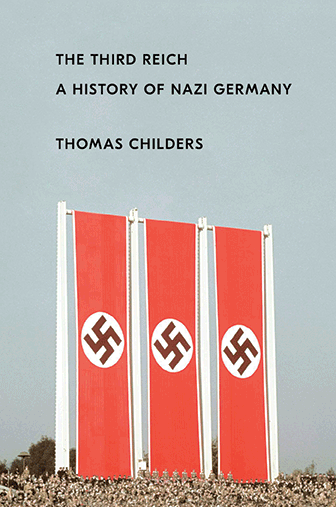
A fresh synthesis of a complex story whose awful ending never changes.
BY JULIA M. KLEIN
Little by little: That, according to Thomas Childers’ authoritative, immensely readable new study, is how Germany sank into the mire of national socialism. The disaster, writes the Sheldon and Lucy Hackney Professor of History Emeritus, was years in the making. And it was neither inevitable nor entirely predictable.
One unforgettable anecdote in The Third Reich encapsulates what Childers calls “the insidious process” by which German society “was diverted, seduced, tricked, threatened and implicated.” A German schoolteacher, speaking to an American Jewish friend after the war, tries his best to offer an explanation:
To live in this process is absolutely not to be able to notice it … And one day, too late, your principles, if you were sensible of them, all rush in upon you. The burden of self-deception has grown too heavy, and some minor incident, in my case my little boy, hardly more than a baby, saying, “Jew swine,” collapses it all at once, and you see that everything … has changed completely under your nose … Too late. You are compromised beyond repair.
Devoid of self-pity, perhaps even meriting some sympathy, it’s a perspective that’s helpful in understanding a country that lost its moral compass.
Childers, moving adroitly between the micro and the macro, has constructed a page-turning history whose ending we know all too well. Drawing on archival sources and published works in both German and English, he melds biography (of Adolf Hitler) with German social, economic, political, diplomatic, and military history, as well as the history of the Holocaust.
Not surprisingly, some aspects of this complex and challenging subject—including the economic bonanza reaped from Jewish expropriation and details of Jewish resistance, such as the 1943 Warsaw Ghetto Uprising—get short shrift or are omitted entirely. Fortunately, other histories, including the late David Cesarani’s brilliant Final Solution: The Fate of the Jews, 1933-1949, have recently revisited this ground. The Third Reich does touch on the episodic German resistance from across the political spectrum: the sputtering opposition of communists and social democrats, the protests of a few church leaders, the heroic pamphleteering of the White Rose, the failed Operation Valkyrie assassination plot.
In the early pages of The Third Reich, Childers seems to wallow in his contempt for the young Adolf Hitler. Twice rejected by the Academy of Fine Arts in Vienna (would that the school had admitted him!), Hitler exhibited “a stunning amalgam of arrogance, anger, and self-pity” and “remained a hopeless dilettante, dabbling, fantasizing, and sliding ever deeper into a world of illusion …”
Despite living for a while on the streets of Vienna, homeless and friendless, Hitler retained his “colossal narcissism.” An Austrian draft dodger, he later served with some distinction in the German army during World War I. Raging over his adopted country’s defeat, he honed his greatest skill, as a mesmerizing orator. Nevertheless, his 1923 Beer Hall Putsch, which landed him in prison, was derided at the time as “hopelessly amateurish, almost laughable, an Italian comic opera.”
Soon enough, the laughter died out. Childers is particularly good on the details of the Nazis’ sophisticated election campaigns, the struggle between the more cautious Nazi leadership and the uncontrollably violent Storm Troopers (SA), and the governmental maneuvering that would eventually lead to Hitler being offered the chancellorship he had long craved.
Campaigning made Hitler a celebrity, a force to be reckoned with. “Even his enemies—and they were legion—were obsessed with him,” Childers writes. “The truth, the facts, hardly mattered, only the successful spin … Hitler and only Hitler could make Germany great again.”
Hitler’s ascendancy owed much to Germany’s economic woes, its reaction to the punitive Treaty of Versailles, and the fragmentation and polarization of its politics. But Childers stresses that it also arose from a fatal misjudgment on the part of high-ranking German conservatives—the notion that, by offering Hitler power, they could somehow tame his worst excesses. They underestimated his “limitless ambition, his capacity for treachery, and his ruthless political acumen,” Childers suggests in the chapter he titles “The Impossible Happens.”
“There was nothing inevitable about that day [January 30, 1933], about Hitler’s rise to power,” he writes. “He was not voted into office, not swept into power on a tidal wave of public support. At the height of their popularity in July [1932] the Nazis had received only 38 percent of the vote, and … it was the largest vote they would ever claim in a free election.”
Still, Hitler, once chancellor, seized control of the levers of power with astonishing speed, initiating, with grassroots backing, the complete Nazification of German society. Childers underlines the brute force required—the roundups, the concentration camps, the mass executions of communists and other political opponents. Meanwhile, the social and economic ostracism of Germany’s Jews began, through boycott, propaganda, laws, and the terror tactics of the SA thugs. Childers also points out some successful Nazi programs—vast public-works projects, like the construction of the Autobahns; and “Strength Through Joy,” with its government-subsidized vacations—that built popular support. So, between fear and hope, the compromises took shape.
The story of the diplomatic run-up to World War II—Hitler’s military provocations and triumphs in Austria and Czechoslovakia; the faltering of the British and the French; the surprising 1939 pact with the Soviet Union—is well-known. What seems more surprising, despite the Nazis’ martial propaganda, is the German populace’s apparent lack of enthusiasm for the approaching war, at least as attested by Social Democratic Party reports.
The early, easy victories sparked national euphoria. But after Hitler attacked the Soviet Union, the war turned into a slog, and the violence directed against Jews accelerated into mass murder. By 1941, “genocide was in the air,” Childers writes—and no direct Hitler order (the Holy Grail for Holocaust historians) was necessary to make it happen.
As Germany’s military fortunes plummeted and its cities were ravaged by Allied bombing, the national mood turned sour. Generals bickered, protested, and revolted, however ineptly. And the discontents that, to some extent, had always lurked beneath “the elaborately constructed façade of social solidarity” exploded into view. A Hamburg woman reported that, in her air raid shelter, “never was the cursing about England or America. Always it was about the Nazis.”
Hitler receded from public view, hiding out in his Berlin bunker, “living on a diet of amphetamines and sedatives,” in failing health and increasingly detached from reality. With the war lost and his closest associates defying his orders, he dictated one last anti-Semitic screed, married his longtime companion Eva Braun, and shot himself.
Childers ends The Third Reich elegiacally, with a catalog of the tens of millions of lives lost, a reference to the German legacy “of guilt, shame, and horror,” and a plea that such a catastrophe not be allowed to happen again. His eloquent chronicle, written in a time of rising nationalism, lends that familiar entreaty added resonance.




